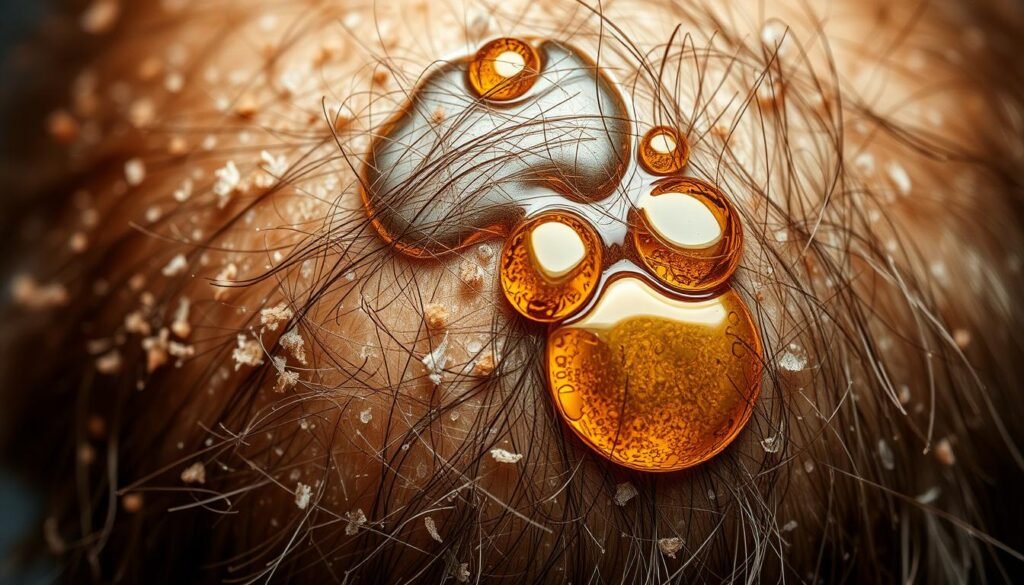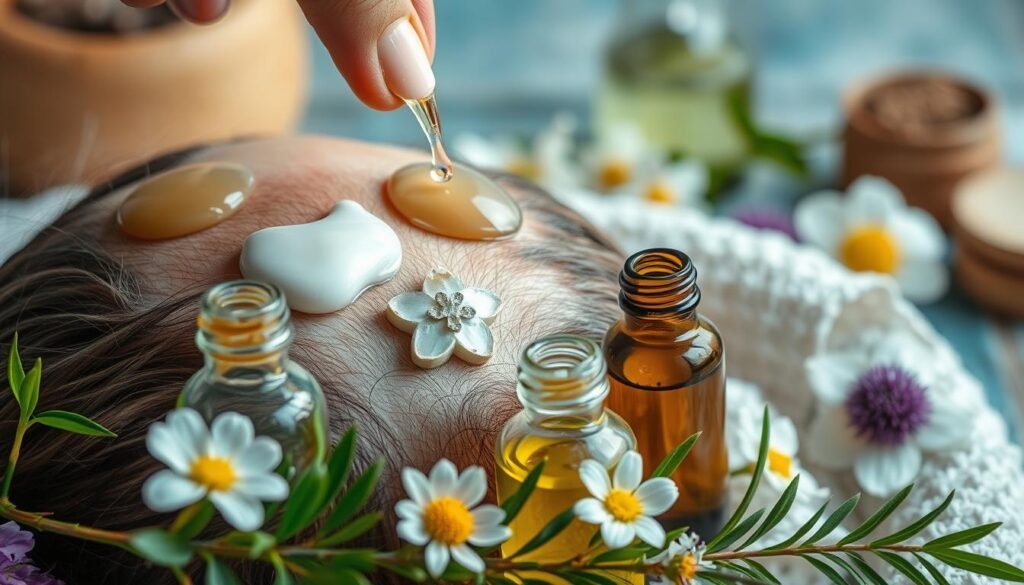More than half of adults face dandruff at some time in their lives. This issue may worsen due to the way we take care of our hair. There’s a lot of confusion about whether putting oil on your scalp is good or bad. This article breaks down the facts about using hair oils for dandruff. It addresses the myths and shows the real effect of oiling on scalp health. Knowing the truth helps in taking care of your scalp better.
Key Takeaways
- Dandruff affects a significant portion of adults, regardless of age.
- Common oiling practices can sometimes worsen dandruff rather than help it.
- Understanding the causes of dandruff is essential for proper treatment.
- Over-the-counter anti-dandruff shampoos are often more effective than oils.
- Myths about oiling hair can lead to ineffective treatments and frustration.
- Regular scalp care is crucial for preventing and managing dandruff.
- Consulting a dermatologist is advised if basic treatments fail.
Understanding Dandruff: Causes and Symptoms
Dandruff is a common scalp issue that often starts in young adulthood and continues into middle age. It causes flaking and itching. This can lead to discomfort and sometimes embarrassment. Knowing the Dandruff Causes and Prevention can really help manage it.
What is Dandruff?
Dandruff means the scalp sheds dead skin cells more than usual. It’s more common in men than women. If your scalp is dry, you might see visible flakes and feel irritation. About half the adults worldwide might have it due to seborrheic dermatitis.
Common Causes of Dandruff
Many things can lead to dandruff, such as:
- Hormonal shifts, especially during teenage years and early adulthood.
- Skin issues like seborrheic dermatitis, psoriasis, or eczema.
- Conditions affecting the nervous system, for instance, Parkinson’s disease or HIV.
- Having an oily or dry scalp.
- Environmental factors, like extreme weather, stress, and not brushing hair enough.
Knowing these Dandruff Causes and Prevention steps can help lower your risk.
Symptoms to Watch For
It’s critical to recognize the Symptoms of Dandruff early on. Symptoms include:
- Flakes on your scalp and shoulders.
- Feeling itchy and irritated on the scalp.
- Seeing dry flakes near your eyebrows.
- In severe cases, it can even cause hair loss.
If symptoms don’t improve or get worse, see a dermatologist. They can check for other skin conditions. Getting ahead of dandruff starts with these basics.
| Factor | Impact on Dandruff |
|---|---|
| Age | More common between teenage years and midlife |
| Gender | More prevalent in males |
| Medical Conditions | Increased risk for those with conditions like Parkinson’s disease and HIV |
| Scalp Condition | Flaking often comes from seborrheic dermatitis |
| Seasonal Changes | Cold winters can make dandruff worse |
Is Oil Good or Bad for Dandruff?
When we ask if oil is good or bad for dandruff, we must look at both sides. Different oils affect the scalp in unique ways. Knowing this helps people choose the right oil for dandruff control.
Analyzing the Impact of Oil on Dandruff
Coconut and olive oils are great for keeping the scalp moist. They have fats that help keep the scalp from drying out. But, these fats might also help a certain yeast grow, which can make dandruff worse.
To avoid this, using oils like mineral oil could be better. Mineral oil doesn’t have the fatty acids that feed the yeast but still moisturizes the scalp.
When Oil Can Worsen Your Dandruff
Too much oil can cause buildup, attracting dirt and bacteria. This can lead to more dandruff. People with oily skin need to be careful with how much oil they use.
Other factors like eating lots of sugar, stress, and not taking care of your hair properly can also make dandruff worse. It’s key to take care of your scalp in more ways than just applying oil.

Common Myths About Oiling Your Scalp
As the popularity of scalp oiling grows, Common Myths About Oiling also increase. These myths can cause confusion about the benefits and effects of scalp oiling. It’s crucial to clear up these wrong ideas for those exploring hair care and fighting dandruff.
Myth 1: Oiling Cures Dandruff
Many think that oiling the scalp can cure dandruff. But oiling may only offer short-lived relief by moisturizing the skin. It doesn’t tackle dandruff’s root causes, such as health issues or a weakened immune system. Hence, oiling alone might not solve the dandruff problem, and more specific treatments are often needed.
Myth 2: Oiling Leads to Greasy Hair
Some believe that oiling will make their hair greasy. This fear can stop people from using oil in their hair care routines. The reality is, using the right type and amount of oil won’t make hair overly greasy. Proper oiling can actually boost moisture and improve hair health without excess oiliness.
Myth 3: Oiling Can Cause Dandruff
There’s a fear that oiling could worsen dandruff. This Dandruff Myth comes from not understanding how oil interacts with the scalp. Properly used, oil forms a barrier that helps keep the scalp hydrated. This can prevent the dryness that often leads to flaking. But, it’s important to choose oils carefully, especially for those with certain scalp conditions.

To manage hair and scalp health effectively, look into proper oiling techniques and products. The right information can be key in debunking common misconceptions related to oiling.
Dandruff Treatment with Oil: What Works?
There are many oils that work well for dandruff. Coconut oil, tea tree oil, and argan oil are top choices. They help manage symptoms and improve scalp health. Knowing how to use these oils right can make them even more effective.
Best Oils for Dandruff Management
- Coconut Oil: This oil moisturizes the scalp and fights the Malassezia fungus. It’s also effective against eczema and fungal infections.
- Tea Tree Oil: With antibacterial and antifungal properties, it’s often found in shampoos. It might help ease itching and inflammation.
- Argan Oil: Rich in fatty acids and vitamin E, it nourishes the scalp. It helps reduce dryness and keep the scalp healthy.
How to Properly Use Oil on Your Scalp
To get the most from these oils, applying them right is key. Here are some steps to follow:
- Choose Your Oil: Pick the oil that fits your scalp needs best. Coconut or argan oil is great for dryness.
- Patch Test: Do a patch test to see if you’re allergic or sensitive to the oil.
- Apply Generously: Massage the oil gently into your scalp. Pay extra attention to dry or flaky areas.
- Recommended Frequency: Two to three times a week is effective. Use less often if you have sensitive skin.
- Wash It Out: Let the oil sit for at least 30 minutes. Then, rinse well with a gentle shampoo.

Using oils can greatly help with dandruff and improve scalp health. It’s wise to speak with a dermatologist for advice tailored to you. If you want to know more about using coconut oil for dandruff, check out this resource.
Natural Remedies for Dandruff
Dandruff is a common issue, affecting half of people worldwide at some point. Many seek Natural Remedies for Dandruff. They turn to essential oils for relief, thanks to their soothing and anti-fungal power.
Essential Oils: Benefits and Application
Lavender and peppermint oils are great for fighting dandruff. Lavender’s calmness helps ease stress, which can spark dandruff in some with seborrheic dermatitis. Peppermint’s cooling effect soothes the scalp. Using these Essential Oils for Scalp regularly fights fungi, thus preventing dandruff.
Combining Oils with Other Treatments
For better outcomes, pair essential oils with other methods. Blending coconut and tea tree oils brings added moisture and fights fungi. Coconut oil also boosts scalp health, shown by research. Including anti-dandruff shampoo with zinc pyrithione or salicylic acid helps keep flakes away. This multi-faceted approach more effectively tackles dandruff.
Anti-Dandruff Oils: Do They Really Work?
When looking for dandruff solutions, many opt for anti-dandruff oils. These oils are known for their unique benefits, thanks to key ingredients. Studies show that some oils have healing properties. They tackle dandruff’s cause. Here are several anti-dandruff oils you might find useful.
Top Anti-Dandruff Oils to Consider
- Tea Tree Oil: Boasts strong anti-fungal abilities, effectively attacking the yeast behind dandruff.
- Neem Oil: Offers anti-inflammatory and anti-fungal properties, soothing the scalp well.
- Coconut Oil: Known for moisturizing, it conditions the hair and fights microbes to reduce dandruff.
- Jojoba Oil: Mimics scalp sebum, helps balance oil production, and hydrates.
Ingredients to Look For in Anti-Dandruff Oils
Choosing the best anti-dandruff oil means looking for key ingredients. Here are important ones to help fight dandruff:
| Ingredient | Benefits |
|---|---|
| Coal Tar | Lowers scalp flakiness and reduces skin cell turnover. |
| Salicylic Acid | Clears away dead skin and curbs scalp irritation. |
| Pyrithione Zinc | Battles bacteria and fungi, curbing dandruff. |
| Essential Oils (Thyme, Bergamot) | Boast anti-fungal qualities for dandruff management. |
With these ingredients, anti-dandruff oils become more effective. It’s crucial to apply these oils properly. This way, you get the most benefits and avoid irritation.
Scalp Care for Dandruff Management
Effective care is vital for a healthy scalp. A routine keeps dead skin from building up and fights dandruff symptoms. Taking care of your scalp makes it look good and boosts hair health.
Importance of Regular Scalp Care
Keeping your scalp clean stops dandruff from getting worse. Dry weather, some hair products, and fungus can make your scalp worse. A soft cleaning routine removes dead skin and keeps moisture right. A clean scalp means less risk of dandruff from too much oil.
Best Practices for Healthy Scalp Hygiene
To improve scalp health, follow these best practices:
- Regular Cleansing: Wash your hair often with a gentle shampoo to avoid dead skin buildup.
- Moisturizing: Use oils like coconut or argan to feed the scalp and control oil.
- Gentle Friction: Massaging the scalp lightly helps blood flow.
- Avoid Harsh Products: Avoid products with harsh chemicals that could bother your scalp.
- Consult Professionals: If irritation keeps up, see a dermatologist.
Keeping your scalp healthy is key to beating dandruff. Stick to a care routine and healthy habits to reduce dry or flaky skin. This makes your scalp better and fights dandruff long-term.
Best Oils to Use for Dandruff
Choosing the right oil for dandruff can hugely affect your scalp’s health. It’s crucial to know the difference between lightweight and heavy oils. Lightweight oils are quick to absorb, perfect for fine hair. Heavy oils, however, give extra moisture for thick hair. Knowing which to use is key for the Best Oils for Dandruff.
Lightweight Oils vs. Heavy Oils
Lightweight oils, like argan and jojoba oil, are great for oily or fine hair. They hydrate without making the scalp too greasy. This helps reduce dandruff. Meanwhile, heavy oils, such as olive or coconut oil, might make the scalp too oily. This can actually feed the yeast causing dandruff.
Which Oils Suit Different Hair Types?
Choosing the right hair oils for dandruff depends on your hair type. Here’s a table that shows different hair types, their recommended oils, and the benefits:
| Hair Type | Recommended Oils | Benefits |
|---|---|---|
| Fine Hair | Argan Oil, Jojoba Oil | Lightweight, non-greasy, absorbs quickly |
| Thick Hair | Olive Oil, Coconut Oil | Moisturizing, provides deep nourishment |
| Curly Hair | Tea Tree Oil, Argan Oil | Hydrating, anti-fungal properties to reduce flakes |
Tea tree oil is also good for dandruff because it fights microbes. Always mix these oils with a carrier oil to avoid irritation. The right hair oil choice will balance your scalp and improve hair health.
Conclusion
Oil’s role in treating dandruff is complex and needs careful thought. Many ask, “Is Oil Good or Bad for Dandruff?” Research shows coconut oil might help. It can improve scalp health and the microbiome, offering a natural solution for dandruff sufferers.
Different oils have unique benefits, especially coconut oil. It helps prevent protein loss and fights microbes. Knowing how to use it can lead to better scalp care. Yet, what works can differ from person to person.
It’s wise to find treatments that match your needs, as oiling doesn’t work the same for everyone. For those wanting more info, a recent study on coconut oil offers new insights. By choosing the right strategies, you can keep your scalp healthy.